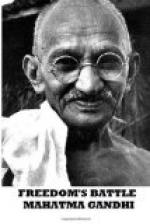August 1920.
SPEECH AT MANGALORE
Mr. Chairman and friends,—To my brother Shaukat Ali and me it was a pleasure to go through this beautiful garden of India. The great reception that you gave us this afternoon, and this great assembly are most welcome to us, if they are a demonstration of your sympathy with the cause which you have the honour to represent. I assure you that we have not undertaken this incessant travelling in order to have receptions and addresses, no matter how cordial they may be. But we have undertaken this travelling throughout the length and breadth of this dear Motherland to place before you the position that faces us to-day. It is our privilege, as it is our duty, to place that position before the country and let her make the choice.
Throughout our tour we have received many addresses, but in my humble opinion no address was more truly worded than the address that was presented to us at Kasargod. It addressed both of us as ’dear revered brothers.’ I am unable to accept the second adjective ‘revered.’ The word ‘dear’ is dear to me I must confess. But dearer than that is the expression ‘brothers.’ The signatories to that address recognized the true significance of this travel. No blood brothers can possibly be more intimately related, can possibly be more united in one purpose, one aim than my brother Shaukat Ali and I. And I considered it a proud privilege and honour to be addressed as blood brother to Shaukat Ali. The contents of that address were as equally significant. It stated that in our united work was represented the essence of the unity between the Mussalmans and Hindus in India. If we two cannot represent that very desirable unity, if we two cannot cement the relation between the two communities, I do not know who can. Then without any rhetoric and without any flowery language the address went on to describe the inwardness of the Punjab and the Khilafat struggle; and then in simple and beautiful language it described the spiritual significance of Satyagrah and Non-co-operation. This was followed by a frank and simple promise. Although the signatories to the address realised the momentous nature of the struggle on which we have embarked, and although they sympathise with the struggle with their whole heart, they wound up by saying that even if they could not follow non-co-operation in all its details, they would do as much as they could to help the struggle. And lastly, in eloquent, and true language, they said ’if we cannot rise equal to the occasion it will not be due to want of effort but to want of ability.’ I can desire no better address, no better promise, and if you, the citizens of Mangalore, can come up to the level of the signatories, and give us just the assurance that you consider the struggle to be right and that it commands your entire approval, I am certain you will make all sacrifice that lies in




